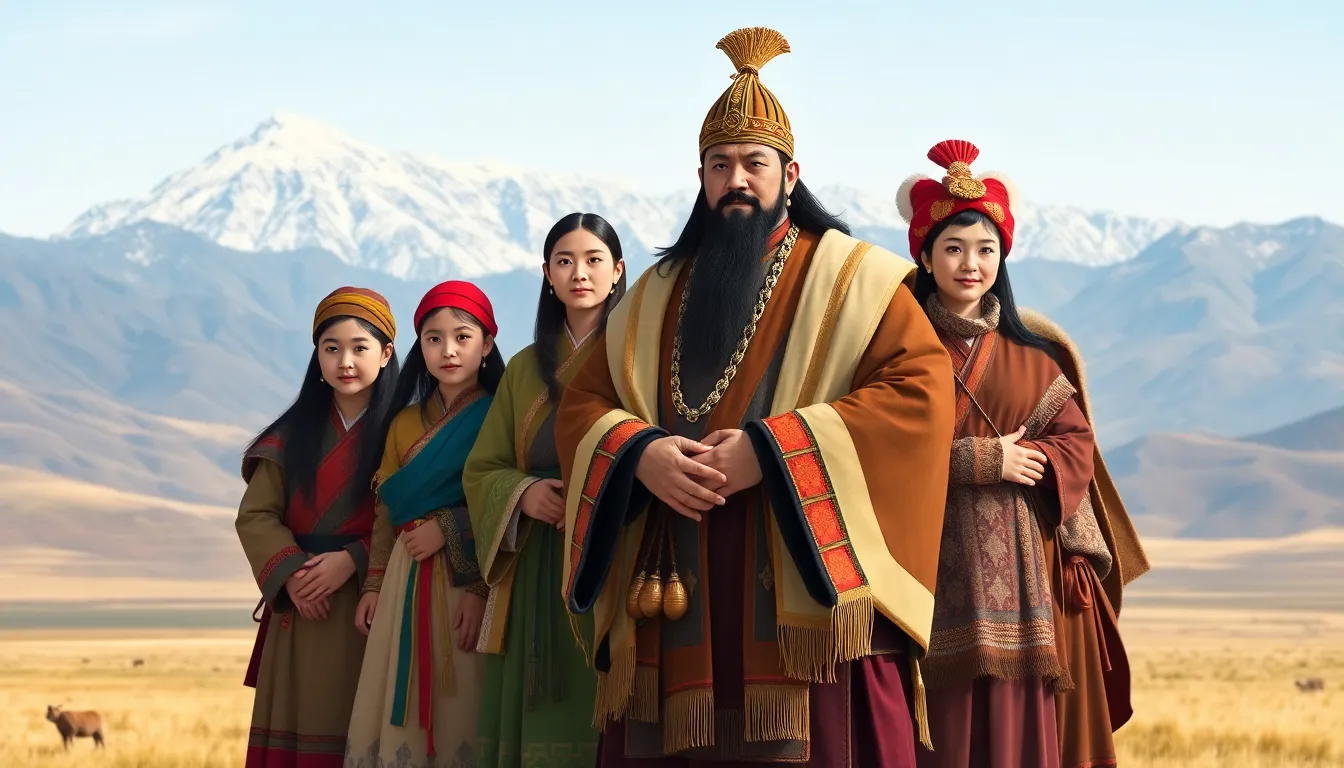Genghis Khan, the legendary conqueror, is often remembered for his vast empire and fearsome reputation. But did you know he might also hold the record for the most prolific dad in history? That’s right! This historical heavyweight didn’t just conquer lands; he reportedly fathered a staggering number of children.
Table of Contents
ToggleGenghis Khan: An Overview
Genghis Khan, a legendary figure, stands out not only for his military prowess but also for his intriguing lineage. His expansive conquests reshaped history, leaving a lasting mark on various cultures.
Life and Conquests
Born as Temujin in 1162, Genghis Khan unified the Mongol tribes and established the Mongol Empire. He launched campaigns that enabled the Mongols to conquer vast territories across Asia and Europe, spreading influence in regions such as China, Persia, and Russia. Under his leadership, the Mongols executed tactical innovations, including the use of mobility in warfare. These strategies contributed to their dominance over established empires. By the time of his death in 1227, the Mongol Empire had become the largest contiguous empire in history.
Legacy and Influence
The legacy of Genghis Khan extends beyond his military achievements. He introduced reforms that improved trade along the Silk Road, promoting cultural exchange and commerce. His administration fostered meritocracy, allowing skilled individuals to rise regardless of their backgrounds. Modern historians recognize Genghis Khan as a key figure in world history, influencing political structures in numerous nations. His descendants, through marriage and alliances, further propagated his genetic legacy across generations. The widespread genes of Genghis Khan’s lineage can be traced in various populations today, illustrating his profound impact on human history.
Genghis Khan’s Children

Genghis Khan’s legacy extends to his children. Historical accounts suggest he fathered multiple offspring throughout his life.
The Number of Children
Estimates indicate Genghis Khan had around 10 to 14 known children, with some scholars proposing the figure may exceed 20. Sons dominated his lineage, playing significant roles in his empire. Each child contributed to the Mongol expansion, consolidating power and influence across vast territories. This extensive offspring count highlights his prominent role in shaping Mongol history and legacy.
Notable Offspring
Among his notable children, Jebe and Jebe became distinguished generals. Another child, Kublai Khan, would later establish the Yuan dynasty in China. Additionally, Tolui, his fourth son, led campaigns that expanded the empire further. Each child’s accomplishments reflect Genghis Khan’s impact on leadership and governance within the Mongol Empire. Their successes ensured the continuation of his vision and ideals long after his death.
The Role of His Children in the Empire
Genghis Khan’s children played vital roles in shaping the Mongol Empire. They contributed significantly to both political and military frameworks, promoting his legacy across generations.
Political Alliances
Children of Genghis Khan often solidified political alliances through strategic marriages. These unions enhanced his power by linking with other influential clans and leaders. For example, Tümen, one of his sons, married into the Kereit tribe, bolstering unity among Mongol factions. Kublai Khan further extended political reach by marrying into Chinese nobility, facilitating the Yuan dynasty’s establishment. These alliances ensured stability within the empire while also integrating various cultures into the Mongol framework.
Military Contributions
The military contributions of Genghis Khan’s children were essential to the empire’s expansion. Sons like Jebe and Tolui spearheaded crucial campaigns against rival territories, demonstrating exceptional leadership. Tolui, as the general of the Mongol armies, played a pivotal role in key victories that extended their conquests into Eastern Europe and Asia. His children adopted innovative tactics inspired by their father, leading to legendary successes in battles like the sack of Nishapur. Their military prowess not only secured territories but also showcased the enduring effectiveness of Genghis Khan’s strategies in warfare.
The Impact on Future Generations
Genghis Khan’s legacy significantly shaped future generations through his descendants and cultural influences. His children played pivotal roles in maintaining the empire and expanding its reach.
Dynastic Rule
Dynastic rule emerged from the strategic alliances formed by Genghis Khan’s sons. Each child contributed to the establishment of a formidable political landscape, ensuring stability and continuity. Kublai Khan, an influential figure, inherited leadership over Mongolia and later established the Yuan dynasty in China. Jebe and Tolui also solidified their father’s vision by leading military expeditions that expanded territorial control. The blending of Mongol and local rulers facilitated a more cohesive governance structure, allowing the empire to thrive even after Genghis Khan’s death.
Cultural Heritage
Cultural heritage flourished under the Mongol Empire, primarily due to Genghis Khan’s children. They promoted trade and cultural exchange along the Silk Road, facilitating cross-cultural interactions. Mongol rulers embraced various traditions, leading to a diverse cultural tapestry within the empire. The intermarriage with local elites further enriched this cultural landscape. Artistic, scientific, and philosophical ideas spread widely, reflecting a harmonious blend of influences. Genghis Khan’s lineage ensured that these cultural advancements continued to resonate throughout history, impacting civilizations for centuries.
Genghis Khan’s legacy extends far beyond his military conquests and the vast empire he built. His numerous children played crucial roles in shaping the Mongol Empire and ensuring its stability and expansion. Through strategic marriages and military leadership, they helped solidify alliances and promote cultural exchange.
The impact of Genghis Khan’s lineage is evident in the historical and genetic influences seen in various populations today. His descendants not only carried forward his vision but also adapted it to new contexts, allowing his legacy to thrive long after his death. The story of Genghis Khan and his children highlights the intricate connections between family, power, and the course of history.



